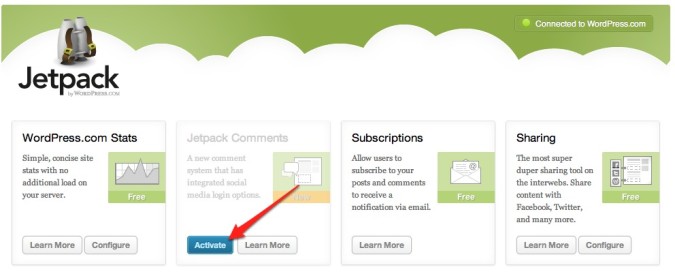 Getting a new comment on your blog can feel like a small victory. After all, it means that someone read your post and cared enough to type out a few words. That’s pretty cool! Unless it’s spam or someone trying to be a troll. Then that’s not so cool. Even so, comments on blogs have become sort of a mainstay. Yet more and more people are opting out, and I can’t help but ask “Why?”
Getting a new comment on your blog can feel like a small victory. After all, it means that someone read your post and cared enough to type out a few words. That’s pretty cool! Unless it’s spam or someone trying to be a troll. Then that’s not so cool. Even so, comments on blogs have become sort of a mainstay. Yet more and more people are opting out, and I can’t help but ask “Why?”
The biggest reason? Managing blog comments is time intensive. There’s no getting around it. Yes, there are tools that make them easier to manage but they still take time and for some developers or blog managers, it may not be time you want to invest. Disabling comments is a quick way to wipe your hands of the situation altogether.
Let’s take some time to evaluate both sides of the argument — pro-comments and not — to see what works best.
Comments: Yay or Nay?
There are cases to be made for both the pro- and anti-comment arguments. Let’s look at both now.
The Case Against Comments
Many bloggers have turned off comments altogether on their WordPress blogs. Why? It’s just too much work. Even with comment moderation plugins and the promise of engaging conversations, the work involved can be overwhelming. Some people just aren’t up to the task of adding comment moderation to their daily workloads. And we can understand that.
There’s also the added headache of opening yourself up to criticism. If you write about something controversial you might not want to have comments open. You’re inviting people to express their opinions and while that can be productive in some cases, it’s also time-consuming to keep up with. And it’s not unheard of for people to attack in blog comments with profanity or slurs. If you can’t keep up with proper moderation, these comments will remain public until they’re addressed and that can reflect poorly on your site.
Including a comment section may also reduce your reach on social media. It may not reduce the number of shares your post gets but it may reduce how many people discuss its content on social sites. If someone leaves a comment on your blog, only those who visit the post will gain access to that comment. However, if someone comments about the post on Facebook, everyone who follows your page or profile will see it — the potential reach for the latter is much greater than the former, which may be enough to encourage you to turn blog comments off.
In a nutshell, avoiding comments altogether means you have one less thing to worry about and you can instead spend your time creating engaging content and running your business, which are arguably more important tasks than sifting through spam comments and flame wars.
The Case For Comments
Despite the perceived hassle of dealing with comments, they can actually be rather useful and are generally worth the effort and time it takes to manage them (in my humble opinion). The best comments serve a very important role in building your site’s reputation and status in your niche.
As I mentioned above, allowing comments opens yourself up to criticism. But that isn’t always a negative thing. Sometimes, people can be very helpful and constructive, and they comment with a critique because they want to add value. That’s worthwhile, if you’re open to it. Furthermore, it’s always nice to hear when you’re doing a good job, and the comments are a place for people to leave compliments, too.
Another benefit of comments is that you make yourself appear more authentic. When someone leaves a comment with a question and you answer promptly, you demonstrate that you care about your blog and your readers. Over time, this simple act can help to build your readership by leaps and bounds and work to establish your blog as something to pay attention to. (I’ve always followed this strategy with my own blog.) The web is social, after all! A blog with a lot of comments is engaging to readers and encourages their engagement as well.
Plus, it establishes a dialogue. Comments are your readers’ way of connecting with you directly and by responding back, you show that you’re not just shouting down at them — you’re willing to listen and willing to discuss. These are important attributes to display if you want to set yourself apart in your niche.
Additionally, you never know what opportunities you’d be missing out on if you opted out of comments. Many friendships and business connections have been formed in the comment section of blogs across every industry. I can say that from personal experience.
Managing Blog Comments
If your site gets any sort of traffic and you do decide to include comments on your site, you need to utilize the most effective comment management tools. Otherwise, you’re going to be up to your eyeballs in spam with no easy way to sort through everything in a timely fashion (if at all). There are several plugins you can use, but I always find myself returning to old faithful.
I am referring primarily to the built-in commenting system for WordPress; my favorite way to manage comments by far. Since it’s part of the WordPress Core, it’s seamless in terms of form and function. You don’t have to worry about any added bloat that a plugin would cause. Also, it has a familiar interface. Those who want to comment would be able to do so with ease.
Additionally, activating Akismet is a must. This will provide spam filtering without you needing to do anything. Every once in a while, you can go into the dashboard and see how many comments Akismet blocked. Just be prepared for your jaw to drop. Without Akismet in place and comment moderation on, your blog would be flooded with spam comments in a matter of hours. So yes, I don’t take this suggestion lightly: if you’re going to use WP Comments, use Akismet, too. No ifs, ands, or buts!
Pro-tip: Couple this comment system with the Jetpack module enabled and the Advanced Comments Moderation plugin to create a truly intuitive and simple way to handle all of your comments through the dashboard that allows guests to identify themselves using their existing social media accounts.
Conclusion
So, are comments worth the effort? In my opinion, they are.
Furthermore, beginner bloggers should embrace the concept wholeheartedly by commenting on other people’s blogs. Yes, I know, it takes time. But this is a task you should be spending time on. It’s a great way of encouraging engagement, creating a loyal readership and establishing yourself as a thought leader in your niche.
Do you allow commenting on your blog(s)? If so, what moderation system do you use? How often do you check and respond to comments? You can let us know — rather appropriately — in the comments.

Thanks Tom for nice post, on these days after the great changes of the algorithm google blog comment is a powerful weapon for placement.
Akismet allows waves of spam to come through, learns what you mark as spam, and then allows more waves of spam to come through until it learns what you mark as spam. That’s a lot of wasted time.
Own your comments, own your data, don’t allow a comment service to control your comments. Those comments are on your site, and you should own and control them.
Spam doesn’t have to be a problem. Simple Comments will completely eliminate comment, and other form, spam, and it works all the time, not just sometimes like Akismet.
http://www.toddlahman.com/shop/simple-comments/
Thanks for the great post Tom. I actually like responding to comments and try to reply as promptly as I can – if someone has taken the time to read my post and leave a comment I feel like it’s only appropriate for me to be timely with a reply. It does take time to leave comments on other blogs & posts, but I find when I do I tend to think more about the article and (hopefully) absorb the information better.
Hello Tom,
Nice article you came up here with.
I have visited many blogs and sometimes I notice that the comments are turned off and this makes me to wonder if one the essence for blogging has changed from been the usual engagement?
Though blog moderation can be a very tasky job especially when one has above 30 commenters and the moderator may not have the luxury of time to respond to all comments, so they end up closing the comment section.
But the truth is that different things work for different person. To some, a comment is just what they need to know that they have written well, but others may not regard those comments.
So which ever works for you is what you should stick to.
thanks for sharing, Philip
Hey,
Are mind-numbingly boring and pointless blog posts worth the effort?
When I come across an article I like or one that has given me some valuable knowledge I comment. I dont think that the link juice from commenting on posts is worth so much these days. I know of some who would never comment due to fear of further algorithm updates on the part of the Google ranking team.
I use Jetpack on my main WordPress powered blog and I have not had any spam problems so far. But to be fair it is still a new project and time will tell 😀
To me, comments are an absolute when it comes to blogging, otherwise it’s just a stream of consciousness, almost like a diary. What most people seem to miss is that blogging is social media, the first stage of social media, and if what you write is pertinent you’ll get some of your articles shared by others. Without comments, many people will just pass by thinking your content isn’t any good, unless you have the authority of someone like Seth Godin, which few have.
Yes, exactly what Mitch said. Without the comments on, anyone’s blog post just feels like a one-way conversation. It’s most aggravating, especially when you have something useful to add.
You some really good points here. But I think that one of the most fulfilling things about blogging is reading comments and responding to them. If ever one writes a controversial post, many would disagree but there are also some people who are soo compelled to defend you against the haters. So, sometimes your readers actually reply for you. It’s just up to you to thank and support them. This really won’t take so much of your time and adds inspiration for you to create more engagings posts in the future.
On a social media perspective, some shares are actually generated due to the comments. So that’s something you also need to consider. I have found comments to be just a pleasure to do for our website (found here btw – http://www.helpmegeek.com/vsc). But that’s me – and i hope many others feel the same too.
Thanks for the post. I agree with what you had said about blog comments build relationships. That includes making comments on others blogs and replying to those who comment on your blog.
Comments on a blog does give it, at least the appearance of having more authority because of the visible readership. This again is building a relationship with your reader base. People continue to want to hear what you have to say if your interesting, engaging and show a level of knowledge. This is done not only in your posts, but also in your blog commenting.
Enjoyed the post!
Your post is very good and informative.Thanks for sharing.
All comments are worth the effort when it comes to engaging communities.